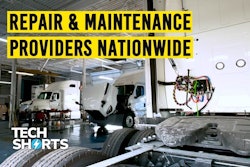Invoice processing often leaves room for human error, leading to data discrepancies that require even more time to investigate and resolve.
Procurement and finance solutions company Corcentric completed an integration with technology provider Trimble to offer a digitized billing solution to help fleets automate process repair orders and invoices.
The system works seamlessly across the entire repair lifecycle. When a truck breaks down or goes into the shop at any location throughout North America, the fleet issues a purchase order, and the shop completes the repair.
From there, Frank Bussone, vice president of technology and data analytics at Corcentric, explained that the company automatically ingests the invoice and repair order from the shop and pushes it directly into Trimble’s TMT Fleet Maintenance system.
[RELATED: Trimble's AI-driven push to transform transportation operations]
Before integration, the process involves multiple manual steps: process order verification, invoice approval, data entry, and routing to accounts payable. With the integration, repair invoices can flow digitally from Corcentric into TMT, automatic process orders matching and approval, and end-to-end automation to reduce errors and minimize administrative burden.
“It’s a seamless pull-through process where we capture all the details of the repair orders, nine digits of the VMRS codes, parts costs, labor costs, descriptions, and comments, all auto populated (directly into the system),” Bussone said.
The company processes about $2 billion worth of invoices and repair orders a year, making a once labor-intensive process into a streamlined digital workflow that runs from purchase order to payment without human intervention.
As a way to further reduce the total cost of ownership, it also offers the Corcentric Analytics for Fleet Efficiency (CAFE), a fleet analytics program that analyzes customer data from various sources, including telematics providers like Samsara, Geotab, and others, to offer actionable insights.
The system integrates depreciation timelines from financing departments, maintenance costs, fuel spend data, and utilization metrics to give fleet managers complete visibility across their operations.
The analytics focus on the link between utilization and financing, helping customers to consider critical factors, Bussone explained, such as, “Are they leaving money on the table by running equipment too long? Leaving money on the table by removing the equipment too soon?” The goal is to bring treasury, finance, and operations departments together to improve fleet expenses.
The company also operates a fleet procurement GPO (Group Purchasing Organization) with around 3,000 fleet group members and 124 suppliers, including Michelin, FleetPride, and Goodyear. The network processes $1 billion annually, giving members purchasing power and cost savings on parts and services.
Members of the GPO automatically receive digitized repair orders and invoices through the integrated billing system.
Navigating industry challenges
With tariffs and emission regulations driving up costs, fleets are extending asset lifecycles and keeping trucks in service longer.
“The industry is pretty much just in a wait and see mode,” said Pat Gaskins, senior vice president of fleet solutions.
However, the fundamentals point toward clear trends.
“When you take a look at asset lifecycle, replacement planning, the cost of the truck, fuel economy, maintenance, repair costs — the cost of the trucks are really going to weigh heavy on longer lifecycles,” Gaskins explained.
While this creates challenges for OEM suppliers and new truck sales, it increases demand for the parts and maintenance services that flow through the company’s GPO network, he said.
“Asset lifecycles are going to be extended just due to the sheer cost,” Gaskins said, adding that unfortunately, the environment will cause smaller carriers to struggle with capital requirements.












